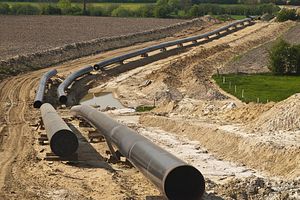Last week, Turkmenistan’s President Gurbanguly Berdimuhamedov attended the opening ceremony for the East-West Pipeline in the town of Belek near the Caspian shore. The pipeline, which began construction in 2010, will transport natural gas from fields in the country’s east–such as the massive Galkynysh field–to the Caspian Sea. Where it goes from there is the subject of Ashgabat’s wildest dreams and desperate economic plans.
The project–a 773-kilometer pipeline–cost $2.5 billion and reportedly has the capacity to transfer 30 billion cubic meters of natural gas per year. The pipeline took slightly longer than expected to complete; statements in 2010 aimed for a June 2015 launch. Meanwhile, the original intentions behind the endeavor have shifted dramatically.
In 2007, the new Turkmen President (Berdimuhamedov’s predecessor Saparmurat Niyazov died in 2006) agreed to build a pipeline along the Caspian shore through Kazakhstan and Russia with the ultimate goal of exporting 10bcm of gas per year to Europe by 2010. The East-West pipeline within Turkmenistan was envisioned as a supply route for that project. But the seeds of future conflict had already been planted.
Berdimuhamedov, in the spirit of diversification, said of Turkmen gas supplies, “Do not worry, there is enough.” He continued to pursue other projects including the trans-Caspian pipeline, which irritated some in Moscow who saw it as an attempt to circumvent Russia’s virtual monopoly on selling gas to Europe.
Also, in 2007 construction began on the Central Asia-China pipeline.
In 2009, the differences in perspective between Russia and Turkmenistan exploded–literally. In April of that year a section of the Central Asia-Center pipeline network, run by Gazprom, near the Turkmen-Uzbek border exploded. Russia blamed the explosion on Turkmenistan’s infrastructure and Turkmenistan blamed Russia, saying a sharp pressure change had ruptured the line. As the BBC noted, at the time Russia was purchasing “nearly all” of Turkmenistan’s gas and re-exporting it to Ukraine and other European countries.
In late 2009, the first line of the Central Asia-China pipeline was inaugurated and with it the reorientation of Turkmenistan’s gas exports began. But instead of diversification, Turkmenistan merely replaced Russia with China as a major gas export destination. By 2011, the second line in the Central Asia-China network was completed and Turkmen exports to China increased. In 2015, Russian purchases of Turkmen gas–which had already fallen from the 2008 high of 40 bcm per year to about 11 bcm per year–dropped to 4 bcm.
It seems likely that if Turkmenistan wants to sell gas to Europe, it cannot go through Russia. Though clearly not all the bridges have been burned–AFP reported that Igor Sechin, the executive chairman of Rosneft, attended the East-West pipeline opening.
Still, all of this leaves the East-West pipeline on the shores of a sea Turkmen gas cannot yet cross. Russia remains obstinate regarding final delimitation of the Caspian Sea, citing environmental concerns but not fooling many with that line of argument. The trans-Caspian pipeline–despite Europe’s grand hopes–remains an expensive and contentious idea still on paper. Nonetheless, earlier this year Marcos Sefcovic, the European Commission vice president in charge of the energy union initiative, said “Europe expects supplies of Turkmen gas to begin by 2019,” after meetings with energy leads from Turkmenistan, Azerbaijan, and Turkey.
Turkmenistan’s quest for diversification is not at a total dead-end. It has been investing in facilities along the Caspian shore–clustered around Turkmenbashi–to produce plastics, gasoline and other goods from (and using) natural gas. But Ashgabat is still banking on exporting gas via pipelines with the trans-Caspian endeavor and the recently launched TAPI project drawing the most attention. Turkmenistan probably has enough gas to fill all of its grandest pipeline dreams, but politics is the determining factor when it comes to which will actually be constructed.

































